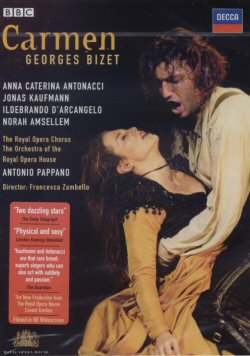|
|
|
|
|
|
|
|
| Opera News, February 2009 |
| JENNIFER MELICK |
|
|
BIZET: CARMEN
|
| Antonacci, Amsellem; Kaufmann, D'Arcangelo;
Orchestra and Chorus of the Royal Opera House, Covent Garden, Pappano.
Production: Zambello. Decca 074 3312, 152 mins., subtitled |
|
 This
Covent Garden Carmen, with its match-up of the exciting Italian mezzo Anna
Caterina Antonacci and German wonderboy tenor Jonas Kaufmann, was hotly
anticipated in 2006, when this DVD was filmed. Decca's marketing people,
understandably, have given the cover of the DVD a movie-poster-style shot of
a ruggedly handsome Kaufmann holding the limp, mortally wounded (but still
glamorous) Antonacci in a gorgeous yellow-and-black gown. Yes, death in
opera can be a beautiful thing. This
Covent Garden Carmen, with its match-up of the exciting Italian mezzo Anna
Caterina Antonacci and German wonderboy tenor Jonas Kaufmann, was hotly
anticipated in 2006, when this DVD was filmed. Decca's marketing people,
understandably, have given the cover of the DVD a movie-poster-style shot of
a ruggedly handsome Kaufmann holding the limp, mortally wounded (but still
glamorous) Antonacci in a gorgeous yellow-and-black gown. Yes, death in
opera can be a beautiful thing.
As Don José, Kaufmann easily meets expectations, both vocally and
dramatically. His transformation from a rule-abiding soldier — with close,
controlled facial expression and body movements — into a deserter obsessed
with having Carmen at any cost is magnificent, and he has the good fortune
to have the right sort of face to project desperation straight into camera
close-ups. After Carmen has snared him, you can watch his helpless agony as
Kaufmann's José comprehends that he has just thrown away everything for her:
his regiment sounds the retreat, and he grasps that he's losing his chance
to return with them, but he is literally trapped by her legs, which she has
wrapped around his neck, cobralike. He is riveting in the lead-up to the
final scene of the opera, with a torn shirt, unshaven and looking like he
hasn't slept in days, roughly grabbing Carmen's face in his hands to prevent
her from leaving. His baritone-ish tenor gives him extra menace and power,
but he still manages to soar beautifully in his big moments; passages in
"non, Carmen, je ne partirai pas" and "laisse-moi te sauver" are so
meltingly beautiful they should have stopped Carmen from defecting to
Escamillo. It is the best Don José I have seen in a long time.
Antonacci's Carmen is a puzzlement. At her live best (such as her splendid
Cassandre in Troyens in Paris in 2003, a role she repeated at Tanglewood
last summer), Antonacci throws herself into roles with an uncompromising
intensity. While she reportedly was mesmerizing in this role live, the
translation to screen is bumpy. As filmed, this is a Carmen who is mostly
hard-edged hauteur — vocally and dramatically — even when she is in
seduction mode, making arias such as "L'amour est un oiseau rebelle" tough
to pull off. Even if she is provocatively washing her legs here, the vocal
equivalent isn't happening. (Ideally, in that aria, the calculation should
be hidden, and only the Gallic, smoky charm should be apparent, but here
it's the other way around.) The other difficulty is Antonacci's unorthodox
vocalism, which is much more audible in a recorded format; she particularly
struggles in "Les tringles des sistres tintaient," where she only
approximates many of the notes in faster passages. She does better in the
séguidille, but even that suffers from the same mix of haughty and slutty
that doesn't quite add up to the free spirit that makes Carmen Carmen.
Among the supporting cast, Ildebrando d'Arcangelo's Escamillo is a little
bleaty at first in "Je suis Escamillo," especially down in his low range,
but he improves as the opera progresses and is unusually appealing in "Si tu
m'aimes" with Antonacci. Norah Amsellem's wide-eyed Micaela — a bit
reminiscent of Mary Pickford — looks sweet but doesn't always sound it.
There's a spot at the end of Act III where the vibrato on her high B-flat is
painfully wide. Best in the smaller roles are Elena Xanthoudakis, who offers
a beguiling Frasquita, and Jacques Imbrailo's fresh-voiced Moralès.
Under Antonio Pappano the orchestra sounds excellent, with an emphasis on
power as opposed to charm. Francesca Zambello's production, designed by
Tanya McCallin, uses one basic movable set, with simple, attractive
red-orange stucco walls, a tree here, a table there, though there are a few
unfortunate moments, such as having poor Escamillo sing "Votre toast" on a
horse — never a good idea. It's not a brilliant staging, but it mostly stays
out of the way and lets you focus on the music and drama.
All in all, this was one of those outings where it was tempting to rename
the opera Don José. |
|
|
|
|
|
|
|
|
|
|